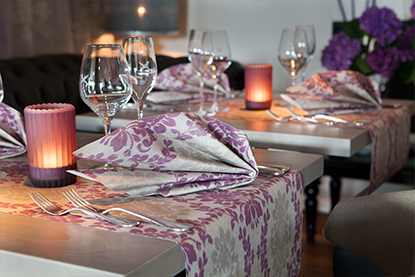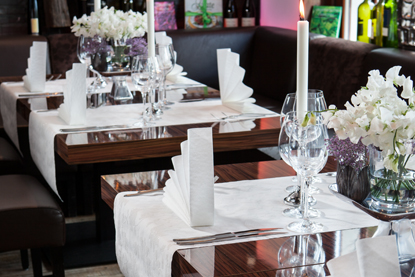Professional business area
Strong position in Europe constitutes platform for geographic expansion
The Professional business area, which focuses on hotels, restaurants and catering firms, accounted for 73% (73%) of Duni's net sales in 2012. Professional comprises two product categories: Table Top and Meal Service. Table Top primarily markets napkins, tablecoverings and candles combined in matching concepts for the set table. Meal Service markets more functional concepts for meals packaging and serving products, for example to-go, take-away, and catering. In addition, Duni sells packaging machinery for sealing food boxes within the Duniform® concept. Table Top accounts for approximately 80% of total sales within the Professional business area.
In Europe, there are estimated to be more than 200,000 end customers. Approximately 90% of sales to these end customers take place through wholesalers and cash-and-carries.
Development in 2012
Sales within Professional amounted to SEK 2,682 (2,766) m. At fixed exchange rates, this entailed a decline of 0.8%. Operating income was SEK 336 (357) m. The operating margin was 12.5% (12.9%).
The number of visits and average spend on the restaurant and hotel market in Europe declined in 2012. Professional achieved sales on par with, or slightly below, the preceding year, but nevertheless succeeded in creating growth on a number of markets despite the weak economic climate. During the year, Duni continued to successfully win over customers from linen to Duni's single-use premium products, and there is a general continued trend towards an increased use of premium products. The launch of Duni's new tablecovering material, Evolin®, contributed to the trend. The product has been particularly well received within the catering area, where flexible solutions are required.

The structural change within the restaurant industry is continuing. Traditional, privately-run restaurants are declining in number, while restaurant chains with strong brands – particularly those focused on ready to eat meals and take-away – are continuing to grow. The trend also impacts on the cash-and-carry sector, since branded chains purchase directly from producers to a higher degree than individual restaurants. Duni is gradually adapting its operations to the changed situation on the market in order to benefit from growth. Among other things, a separate organization has been created for the range of products for ready to eat meals and take-away (the Meal Service product category).
In central Europe – Duni's largest market – Germany reported unchanged sales compared with 2011, while sales in Austria grew due to an increase in tourism. On the other hand, sales on the Swiss market fell as a consequence of the country's strong currency.
Southern Europe was negatively impacted by the European debt crisis, which in total resulted in a fall in sales of 5-10% for suppliers of tabletop products. Duni's sales, on the other hand, remained unchanged compared with last year, entailing that Duni gained market shares in the region. These successes are in part attributable to the intensified work undertaken during the year on expanding the product range in the form of table top concepts involving tablecoverings, napkins and other tabletop products, combined in matching colors.
The restaurant industry remained stable, with Sweden being one of the few countries in Europe to demonstrate growth. Duni lost sales in Denmark, but demonstrated stability in other countries. In the UK, Duni discontinued a number of unprofitable contracts, which led to lower sales but increased profitability.
Duni’s sales in Eastern Europe continued to increase in 2012, in part due to premium napkins winning market shares at the expense of linen napkins. Russia constitutes Duni's most promising market in the region with a total of 21,000 hotels and restaurants, and Duni enjoyed a growth rate of 48% in 2012.
Duni is intensifying its work on increasing sales in the Middle East, South Africa and promising markets in Asia. Exports to the Middle East have been gradually increasing over many years, but are still modest on other markets. The most interesting growth markets comprise rapidly expanding metropolitan areas in South America and Asia, with a growth averaging 20%, a high proportion of meals eaten outside the home, at the same time as penetration within the substitutable tabletop products area has thus far been low.
Table top products accounted in total for 90% of net sales within the business area, with meal packaging accounting for the remaining 10%. Central Europe accounted for SEK 1,578 (1,640) m of net sales, while the Nordic region accounted for SEK 614 (635) m. Southern and Eastern Europe accounted for SEK 455 (462) m and other markets for SEK 35 (29) m.
Unique sales model
Within the Professional business area, Duni has developed a sales model which is unique in the industry and specifically adapted to the customer structure and the role Duni's products play for customers within the HoReCa segment.
The model is based on the Company having its own large sales organization, which devotes most of its time to presenting the product range to end users. Professional's sales force makes a substantial number of visits annually, with approximately half the visits taking place to customers at restaurants, hotels and catering firms.
The frequent visits build up a strong relationship, while a great deal of time is devoted to presenting new products, concepts and collections which create value for both customers and end customers. By continuously demonstrating new areas of use and ways of combining the products, they can be used in an optimum manner by each customer, which contributes to the customer's own profitability.
The customers place their orders with wholesalers, either directly at the wholesaler or through Duni's sales personnel. This constitutes the basis for a strong partnership with both wholesalers and end customers. Some 90% of sales take place in this way via wholesalers and cash-and-carry stores.
The visits to end users distinguish Duni from its competitors, whose sales are primarily focused on wholesalers and cash-and-carries.
Parallel with the sales work at end customers, visits also take place to wholesalers and cash-and-carries. Wholesalers are increasing in importance and currently account for some 50% of sales. Duni provides sales personnel at wholesalers with training in the sale of table top concepts and how Duni's products can be used to the best effect. The sales personnel thereby become knowledgeable and effective ambassadors for Duni's products. Together with wholesalers, visits are also made to major end users.
Within the cash-and-carry segment, customers are served centrally by key account management.

Push/pull-effect
The sales model involves customers being visited by both Duni and by the wholesaler or cash-and-carry, which creates a push/pull effect. The model was introduced in Germany in the 1980s and has spread to other markets, a factor which has strongly contributed to Duni's position.
The end customers are also registered in a database in which sales personnel can see the purchasing patterns and needs of different customers. This helps them to continuously provide suggestions for new solutions and products, and to conduct sales campaigns.
Customer categories
The restaurant industry is very fragmented, but there are some chains, often with well-defined business concepts. Within the restaurant industry there is a trend towards a clearer segmentation, with strategies focused on quality, lifestyle and price level constituting the basis for the business and dictating its focus. Restaurants on higher quality and price levels account for the overwhelming majority of purchases of Duni’s premium products, i.e. higher quality products, often deep dyed or with color print. Take-away is a rapidly expanding segment within the restaurant industry, and one on which Duni develops products in close cooperation with its customers.
The hotel industry is less fragmented than the restaurant industry. Hotel operations – usually with integrated restaurant operations – are often conducted in chains with centralized purchasing. Hotels on higher quality and price levels account for the overwhelming majority of purchases of Duni’s premium products.
In addition to catering, the larger firms in the catering industry also offer and operate commercial kitchens within both the private and public sector. Within the areas of contract catering and concession catering, the market is dominated by a small number of large companies with international operations. In addition, there are a very large number of smaller companies.
Content
The Professional business area's strategy in brief:
- To be the leader within the premium segment.
- Growth through geographic expansion with focus on increased market shares in Southern and Eastern Europe and the UK.
- To take advantage of new trends and concepts on the HoReCa market, such as increased demand within take-away.
| Net sales | Operating income | |
| 2008 | 2 771 | 368 |
| 2009 | 2 885 | 402 |
| 2010 | 2 783 | 384 |
| 2011 | 2 766 | 357 |
| 2012 | 2 682 | 336 |
Net sales per product group, %
| % | |
| Napkins | 50 |
| Candles | 5 |
| Packaging solutions | 10 |
| Serving products | 8 |
| Tablecoverings | 25 |
| Other | 2 |
Net sales per geographic region, %
| % | |
| Nordic region | 23 |
| S. and E. Europe | 17 |
| Central Europe | 59 |
| Other | 1 |
Här kan man lägga lite text.
Denna text ska till höger

